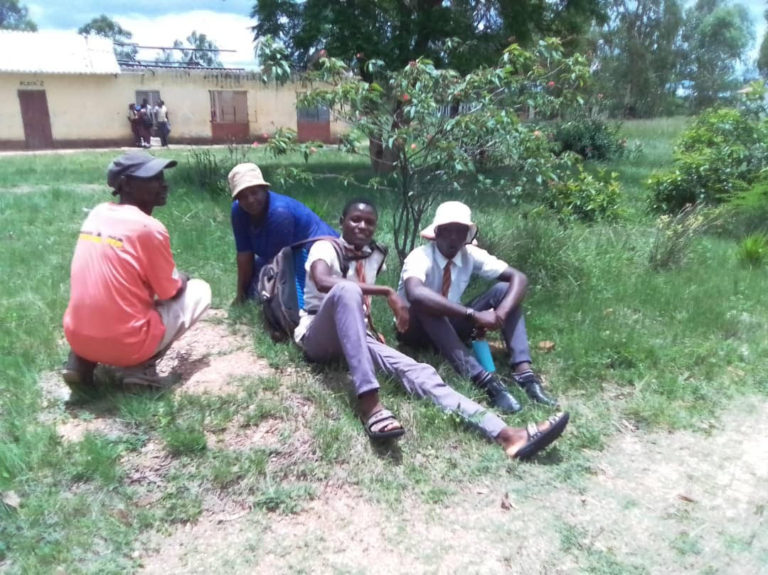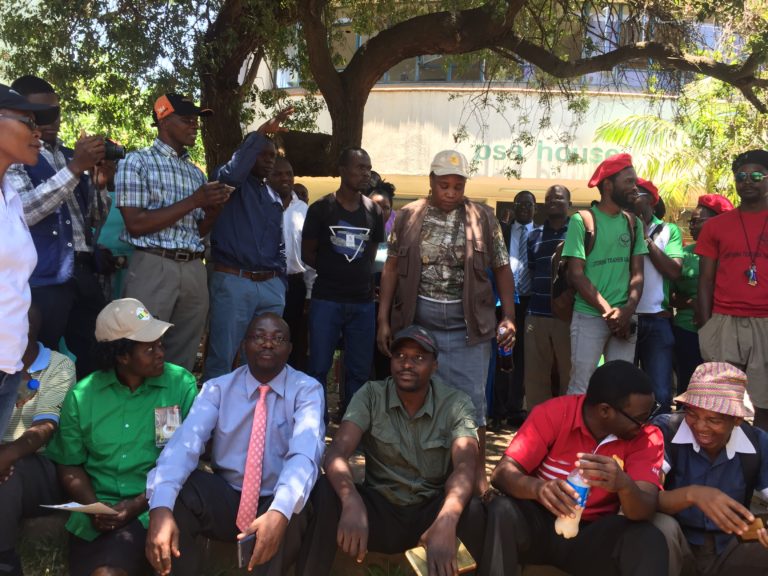Binga — With its classrooms thatched, its walls built using home-made bricks and located in Binga, a remote area in Zimbabwe’s Matabeleland North Province, Zumana Secondary school apparently stands weighed down by leaking roofs, with the grass thatch gradually falling apart.
Approximately 436 kilometers from Zumana school South-East of Binga, lies yet another perishing school — Melisa secondary, which is in Silobela, an agricultural village located in Kwekwe district in this Southern African nation’s Midlands Province, about 60 kilometers west of Kwekwe town.
One of the classroom blocks with ages-old fading greenish paint stands out without half of its asbestos roofing sheets, blown away by the wind in the previous years, according to local pupils.
“I remember I was doing grade three when the roof was taken away by the wind and I’m in grade seven now,” a 15-year-old school pupil who identified himself as Melusi Mpabanga, told Ubuntu Times.

A teacher who preferred to remain anonymous saying he was forbidden to speak to the media, said, ‘here at Melisa, most of my students have to sit on the cracked floors each time during lessons conducted in classrooms with broken window pens.’
Fearing victimization, yet another teacher at Binga’s Zumana secondary school who also spoke on condition of anonymity, said ‘we have four thatched classrooms which we use for teaching and learning.’
“The thatched classrooms all have leaks and during rainy seasons, learners’ books get destroyed. Teaching at such an institution is really a bad experience. The teachers’ cottages are also grass-thatched and they leak, which makes life unbearable for us,” the Zumana school teacher told Ubuntu Times.

Yet the sorry state of Zimbabwe’s schools is not only in the remote areas but has also cascaded down to urban areas amid a comatose national economy.
Civil society activists blame authorities for not prioritizing education, instead directing government revenue towards fattening their own pockets.
“For selfish reasons, government leaders are clearly paying zero attention to the sad developments in schools in terms of infrastructures which have collapsed,” Claris Madhuku, who is director of the Platform for Youth Development, a Zimbabwean civil society organization, told Ubuntu Times.

Touched by the state of Zimbabwe’s deteriorating schools’ infrastructure seven years after he left office, David Coltart who was the Minister of Education back then, pinned the blame on lack of prioritization of the country’s education system by the authorities here.
“For years, in fact for decades, schools’ infrastructure has been deteriorating because to be frank there is simply insufficient budget being allocated to education; government boasts about the fact that the bulk of the budget goes to education, but in my experience, the amount actually paid out, there is no relationship with the theoretical budget figure; and even that theoretical budget figure is insufficient,” Coltart told Ubuntu Times.
For 2021, Zimbabwe’s Ministry of Primary and Secondary Education received a total allocation of $55,221 billion (in local currency), an equivalent of about 55 million United States dollars.
This to Coltart, is a drop in the ocean.
“If we wish to make education a priority, that needs to be reflected in the amount of money that we spend and there need to be dramatic cutbacks elsewhere, in govt spending,” said Coltart, who is now treasurer-general of Zimbabwe’s opposition Movement for Democratic Change Alliance (MDC Alliance).

The Zimbabwean government has however been on record in the media claiming to be making major boosts of the country’s infrastructure in schools.
Earlier this year, Zimbabwe’s Deputy Minister of Primary and Secondary Education, Edgar Moyo told parliament government was aware of the run-down infrastructure at some schools in the country, saying government continued to prioritize revamping them.
But even as dilapidation haunts Zimbabwe’s schools, government instead boasts of having more schools, about 6,000 primary and secondary schools, according to statistics from the Zimbabwe National Statistics Agency (ZIMSTAT).

For teachers’ trade unions, even as the regime brags about having multiple schools, it amounts to nothing amidst dereliction of the infrastructure.
“The level of dilapidated infrastructure in schools is not only worrisome but rather pathetic and in a sorrowful state. The infrastructure is basically from the colonial era and not much changes have been effected to go with modern time and in most instances, especially in rural areas, the infrastructure is virtually nonexistent as teachers and learners are forced to conduct lessons in makeshift structures and under trees,” Robson Chere, secretary-general of the Amalgamated Rural Teachers Union of Zimbabwe (ARTUZ), told Ubuntu Times.
Yet as they earn little, Zimbabwean teachers want the best to help them deliver service to the country’s learners.
The lowest-paid teacher in Zimbabwe now earns a monthly salary of $19,975 in local currency, which is the equivalent of 245 USD, with the highest-paid teacher earning 281 USD.

“As a union, we are advocating for an educational equalization fund; our dream is to see a Zimbabwe which provides equal opportunities in education regardless of the location of a learner or school,” Munyaradzi Masiyiwa, ARTUZ deputy Secretary-General, told Ubuntu Times.
But amid dilapidated infrastructure across Zimbabwe’s schools here, Masiyiwa’s may remain a pipe dream, for before, some like Coltart tried with little success to revamp the country’s citadels of education.
“I last made an attempt to tackle the deteriorating schools’ infrastructure in my last year in cabinet in 2013; I developed the schools development project working between UNICEF on the one hand and individual schools on the other and we devised a program whereby money went straight from donors to schools committees and headmasters; I’m not sure how that is running now, but driving around the country, it seems to me there is very little taking place and schools’ infrastructure is collapsing everywhere,” Coltart said.

















